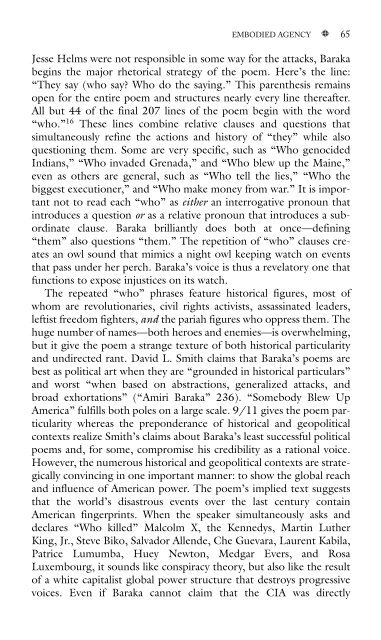american political poetry in the 21st century - STIBA Malang
american political poetry in the 21st century - STIBA Malang
american political poetry in the 21st century - STIBA Malang
You also want an ePaper? Increase the reach of your titles
YUMPU automatically turns print PDFs into web optimized ePapers that Google loves.
EMBODIED AGENCY 65<br />
Jesse Helms were not responsible <strong>in</strong> some way for <strong>the</strong> attacks, Baraka<br />
beg<strong>in</strong>s <strong>the</strong> major rhetorical strategy of <strong>the</strong> poem. Here’s <strong>the</strong> l<strong>in</strong>e:<br />
“They say (who say? Who do <strong>the</strong> say<strong>in</strong>g.” This paren<strong>the</strong>sis rema<strong>in</strong>s<br />
open for <strong>the</strong> entire poem and structures nearly every l<strong>in</strong>e <strong>the</strong>reafter.<br />
All but 44 of <strong>the</strong> f<strong>in</strong>al 207 l<strong>in</strong>es of <strong>the</strong> poem beg<strong>in</strong> with <strong>the</strong> word<br />
“who.” 16 These l<strong>in</strong>es comb<strong>in</strong>e relative clauses and questions that<br />
simultaneously ref<strong>in</strong>e <strong>the</strong> actions and history of “<strong>the</strong>y” while also<br />
question<strong>in</strong>g <strong>the</strong>m. Some are very specific, such as “Who genocided<br />
Indians,” “Who <strong>in</strong>vaded Grenada,” and “Who blew up <strong>the</strong> Ma<strong>in</strong>e,”<br />
even as o<strong>the</strong>rs are general, such as “Who tell <strong>the</strong> lies,” “Who <strong>the</strong><br />
biggest executioner,” and “Who make money from war.” It is important<br />
not to read each “who” as ei<strong>the</strong>r an <strong>in</strong>terrogative pronoun that<br />
<strong>in</strong>troduces a question or as a relative pronoun that <strong>in</strong>troduces a subord<strong>in</strong>ate<br />
clause. Baraka brilliantly does both at once—def<strong>in</strong><strong>in</strong>g<br />
“<strong>the</strong>m” also questions “<strong>the</strong>m.” The repetition of “who” clauses creates<br />
an owl sound that mimics a night owl keep<strong>in</strong>g watch on events<br />
that pass under her perch. Baraka’s voice is thus a revelatory one that<br />
functions to expose <strong>in</strong>justices on its watch.<br />
The repeated “who” phrases feature historical figures, most of<br />
whom are revolutionaries, civil rights activists, assass<strong>in</strong>ated leaders,<br />
leftist freedom fighters, and <strong>the</strong> pariah figures who oppress <strong>the</strong>m. The<br />
huge number of names—both heroes and enemies—is overwhelm<strong>in</strong>g,<br />
but it give <strong>the</strong> poem a strange texture of both historical particularity<br />
and undirected rant. David L. Smith claims that Baraka’s poems are<br />
best as <strong>political</strong> art when <strong>the</strong>y are “grounded <strong>in</strong> historical particulars”<br />
and worst “when based on abstractions, generalized attacks, and<br />
broad exhortations” (“Amiri Baraka” 236). “Somebody Blew Up<br />
America” fulfills both poles on a large scale. 9/11 gives <strong>the</strong> poem particularity<br />
whereas <strong>the</strong> preponderance of historical and geo<strong>political</strong><br />
contexts realize Smith’s claims about Baraka’s least successful <strong>political</strong><br />
poems and, for some, compromise his credibility as a rational voice.<br />
However, <strong>the</strong> numerous historical and geo<strong>political</strong> contexts are strategically<br />
conv<strong>in</strong>c<strong>in</strong>g <strong>in</strong> one important manner: to show <strong>the</strong> global reach<br />
and <strong>in</strong>fluence of American power. The poem’s implied text suggests<br />
that <strong>the</strong> world’s disastrous events over <strong>the</strong> last <strong>century</strong> conta<strong>in</strong><br />
American f<strong>in</strong>gerpr<strong>in</strong>ts. When <strong>the</strong> speaker simultaneously asks and<br />
declares “Who killed” Malcolm X, <strong>the</strong> Kennedys, Mart<strong>in</strong> Lu<strong>the</strong>r<br />
K<strong>in</strong>g, Jr., Steve Biko, Salvador Allende, Che Guevara, Laurent Kabila,<br />
Patrice Lumumba, Huey Newton, Medgar Evers, and Rosa<br />
Luxembourg, it sounds like conspiracy <strong>the</strong>ory, but also like <strong>the</strong> result<br />
of a white capitalist global power structure that destroys progressive<br />
voices. Even if Baraka cannot claim that <strong>the</strong> CIA was directly










